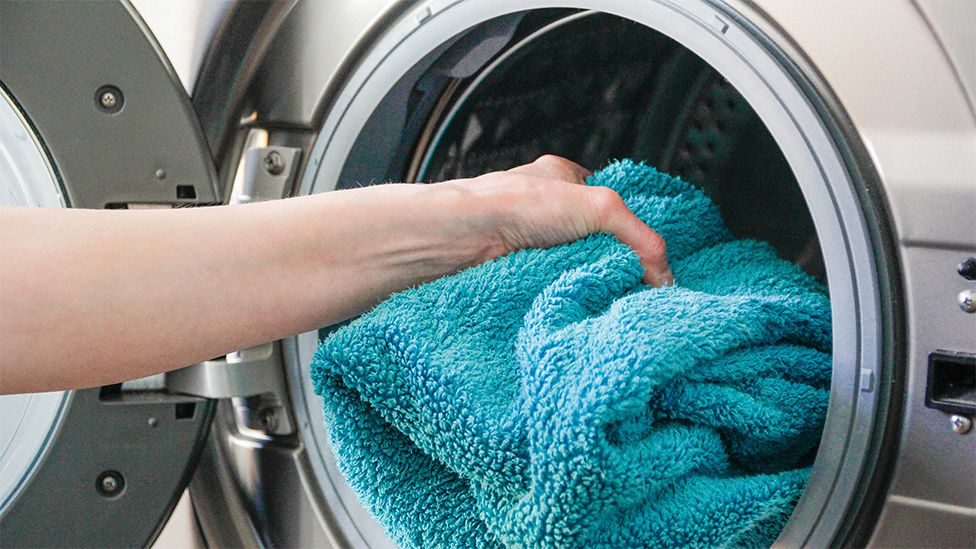
You might think your towels look clean but Dr Sally Bloomfield says “microbes are invisible and can build up”
By Manish Pandey
BBC Newsbeat
Hot weather presents a unique chance to get as much washing done as possible before you have to turn the heating on again.
And as the UK experiences a late summer heatwave, you might have noticed more laundry drying outdoors than usual.
But when the sun fades and you’re back to wondering whether you can squeeze your favourite T-shirt on to the clothes horse, there’s one item lots of us overlook.
Just how often should you be washing and changing them?
It’s a debate which sparked into life after presenter Roman Kemp posted about it earlier this year, and now a new survey of 2,200 UK adults suggests no-one is totally sure.
Of those asked, 44% said they would wash their towels after three months or more.
So what does Dr Sally Bloomfield, a home hygiene expert and specialist in preventing infectious disease, make of that.
“I am somewhat shocked, because I would have thought that the towels would become encrusted, sweaty and be very uncomfortable to use,” she tells BBC Newsbeat.
Almost one in five surveyed said they washed their towels once a month, a quarter said once a week and one in 20 chose to wash every day after a bath or shower, according to data from a shower company.
Why do we even need to wash our towels?
To cut to the chase for how long you should leave it, Dr Bloomfield says “a sensible amount would be at least once a week”.
“Despite the fact they may look clean, they’ll have picked up millions of germs over time and could be a serious health hazard to whoever you live with.”
She says if you don’t wash your towels regularly “the number of organisms on the towels builds up”, and when it comes to laundry time “it’s very difficult to remove all of them”.
That’s where things can get problematic.
Image source, Getty Images
Of those asked, 44% said they would wash their towels after three months or more
When we dry the different areas of our body, they pick up organisms – such as on our feet like the one that causes athlete’s foot.
Most organisms on our skin may not be infectious, but if they get into cuts and abrasions it can “cause infections and be serious”, Dr Bloomfield says.
Does living alone matter?
If you’re living with others, then you should be extra careful.
“Sometimes we will be carrying organisms that may not cause us to be ill at that moment, but if we pass them on to other people they can become ill,” says Dr Bloomfield.
They can be passed on to other people if you share a towel, but also if you wash your stuff in the same laundry load as other people’s items.
“So there’s good evidence infections can be spread.”
You might think if you’re living alone, the risk to and from others is reduced.
And you’d be right – but Dr Bloomfield advises even in that situation you shouldn’t “leave it longer than a fortnight”.
Image source, Getty Images
The experts say you definitely want to make sure you’re washing your gym towel regularly
Dr Cristina Psomadakis is a consultant dermatologist for the NHS and says she “would encourage people to check in with their towels and their towel washing schedule”.
“If you’re someone that suffers from facial or body acne or inflammation of hair follicles, we want you to be washing your towel frequently.”
She says poor home hygiene, including with towels, can be a contributing factor in developing skin conditions.
“You’ve got to address those hygiene themes. Otherwise, the thing is going to keep being a problem for you.”
A towel for the face and the gym
If you’re keen on a workout, chances are you’ll have a towel to wipe the sweat as you feel the burn.
Dr Bloomfield says if you’re using a towel to wipe sweat, it’s important to wash it regularly.
“You’re raising sweat, shedding skin cells from the surface of your body and more bacteria on to the towel.”
She says if you don’t, it will become more “heavily contaminated” and then harder to decontaminate in the wash.
And if you’re wondering whether you need a separate face and body towel – Dr Psomadakis definitely recommends keeping different towels.
“Don’t forget that when you’re using a body towel you’re towelling off places where the sun doesn’t shine, where you might have certain types of bacteria that are related to bowel movements.
“You still might have different types of organisms that you don’t want anywhere near your face,” she says.
Dr Bloomfield accepts there are environmental and cost concerns about using washing machines but says it’s better to wash regularly on a low temperature, than at high temperatures once in a while.
“Keep your microbes to yourself.”








